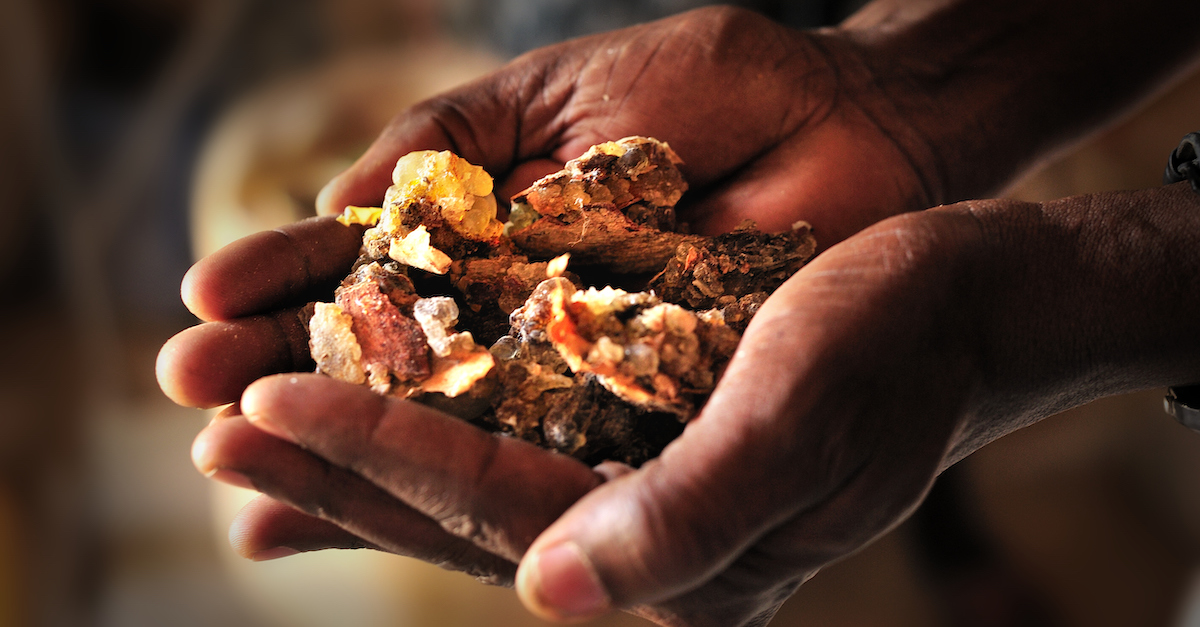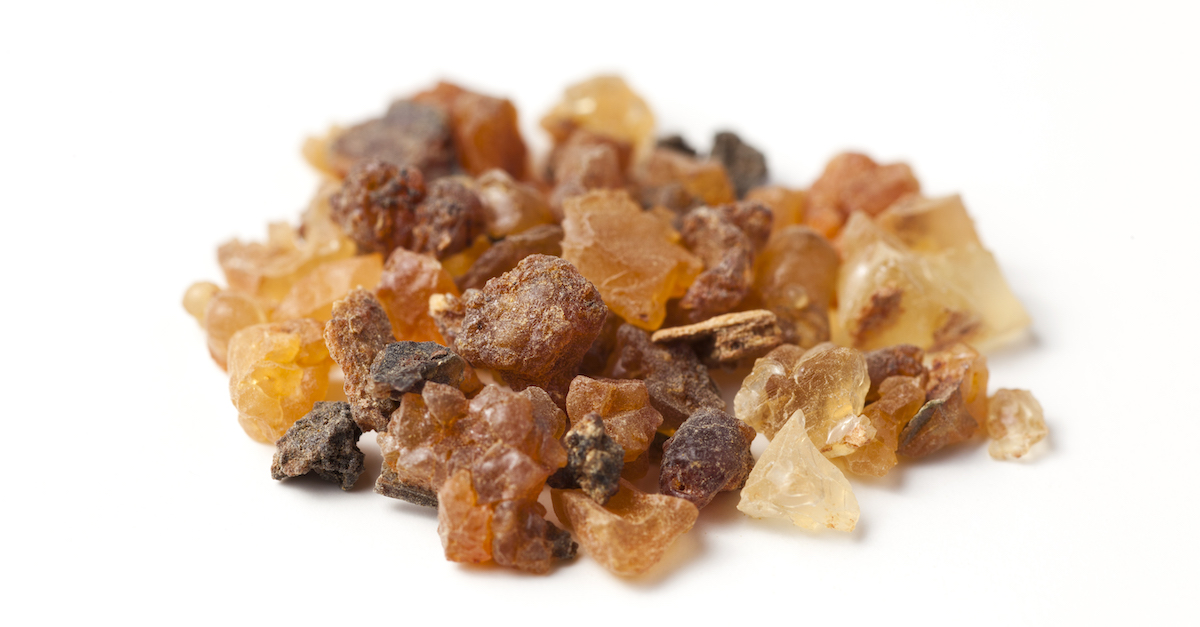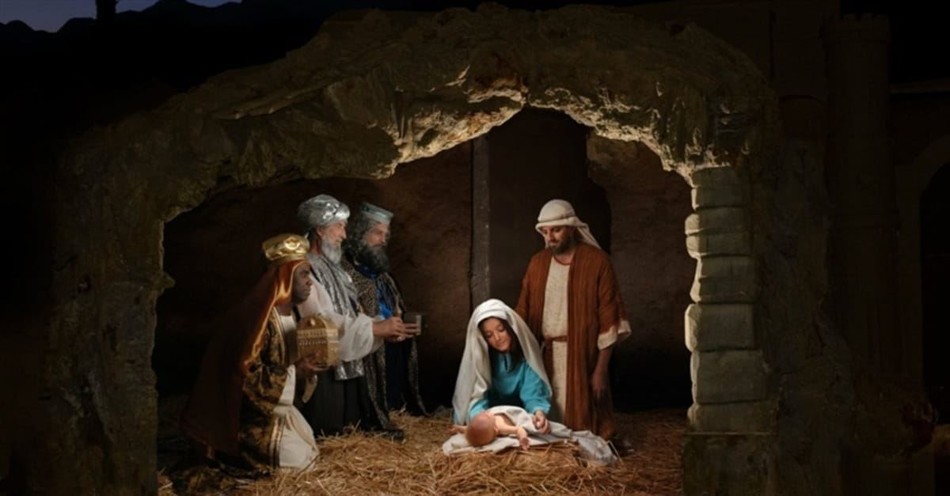When taken as gifts for a newborn king, the items that the Magi brought appear inappropriate, especially the frankincense and myrrh. Gold fits the idea of kingly wealth, but perfumes would not have met the same standard. But what about frankincense (a costly and fragrant gum and oil from a tree in India and Arabia) and myrrh (an aromatic spice from a thorn-bush grown in Arabia and Ethiopia)?
We must, instead, imagine the gifts as offerings of foreign dignitaries. Just as diplomats from other countries often bring gifts representing their cultures, these magi brought the products specific to theirs. They honored the King of the Jews in a way that fit their nationality. In this way, in fact, they stood in as representatives of all the non-Jewish nations. Their acknowledgement presaged the offer of grace to all peoples of the earth, and their gifts hinted at the coming of Gentiles to offer themselves to Christ.
The ancient church also understood the gifts to symbolize aspects of Christ's life and ministry, the work He would do. The gold, as mentioned before, suggested His royalty as King of the Jews and Lord of lords. In the frankincense, they saw His divinity. The myrrh represented His humanity - and that to the fullest extent because myrrh suggests death and burial. Thus, the gifts came to show Jesus as King, God, and Man. (Adapted from The Life and Times of Jesus the Messiah by Alfred Edersheim (Book II, Chapter VIII).)
Let's read about the birth of Jesus Christ and why the Magi brought gifts then we will dive deeper into the meaning of the gold, frankincense, and myrrh given.
The Bible Story of Gold, Frankincense and Myrrh
"After Jesus was born in Bethlehem in Judea, during the time of King Herod, Magi from the east came to Jerusalem and asked, “Where is the one who has been born king of the Jews? We saw his star when it rose and have come to worship him.” When King Herod heard this he was disturbed, and all Jerusalem with him. When he had called together all the people’s chief priests and teachers of the law, he asked them where the Messiah was to be born. "In Bethlehem in Judea," they replied, “for this is what the prophet has written: " 'But you, Bethlehem, in the land of Judah, are by no means least among the rulers of Judah; for out of you will come a ruler who will shepherd my people Israel.'"
Then Herod called the Magi secretly and found out from them the exact time the star had appeared. He sent them to Bethlehem and said, "Go and search carefully for the child. As soon as you find him, report to me, so that I too may go and worship him." After they had heard the king, they went on their way, and the star they had seen when it rose went ahead of them until it stopped over the place where the child was. When they saw the star, they were overjoyed. On coming to the house, they saw the child with his mother Mary, and they bowed down and worshiped him. Then they opened their treasures and presented him with gifts of gold, frankincense and myrrh." - Matthew 2:1-11
Gold

Photo credit: iStock/Getty Images/Zen Rial
The Magi’s gift of gold to Jesus was more than just a token of wealth—it was deeply symbolic and holds powerful lessons for us today. In biblical times, gold was associated with royalty, representing Jesus’ identity as the King of kings. By presenting this precious metal, the Magi were honoring His sovereignty and acknowledging that this child born in a humble manger was destined to reign over all.
Gold also pointed to Jesus’ divine nature. In the Old Testament, gold was used in the Temple to signify God’s holiness, such as in the Ark of the Covenant. By offering gold, the Magi recognized Jesus not just as a king, but as someone set apart, holy, and worthy of worship. In their hearts, they knew this child wasn’t just an earthly ruler—He was God’s Son, come to fulfill His divine plan of salvation.
The gold given by the Magi was likely a providential gift that sustained Joseph, Mary, and Jesus during a critical and uncertain time. Shortly after their visit, an angel warned Joseph in a dream to flee to Egypt to escape King Herod’s attempt to kill Jesus. This urgent journey would have been costly, and gold—being valuable and easily traded—could have provided the financial means for their travel and resettlement in a foreign land. Once in Egypt, the Holy Family would have needed resources to secure shelter, food, and other necessities. The gold may have helped them navigate life as refugees until it was safe to return to Israel.
What’s even more striking is what this teaches us today. Gold represents the very best we have to give. The Magi’s journey and their gift challenge us to ask: are we offering Jesus the “gold” of our lives—our best time, attention, and devotion? Just like they traveled far to worship Him, we’re called to honor Jesus with open hearts, recognizing Him as our King and Savior. Their gift wasn’t about the value of the gold itself; it was about the act of worship and surrender.
Frankincense

Photo credit: Getty Images/Yannick Tylle
Frankincense is a fragrant resin from the Boswellia tree, often used in ancient times for worship, anointing, and healing. In the Bible, frankincense was a key ingredient in the holy incense burned in the Tabernacle and Temple, symbolizing prayers rising to God. It was also added to grain offerings as a pleasing aroma to the Lord and was known for its medicinal properties, such as treating wounds and inflammation.
By giving frankincense, the Magi were acknowledging Jesus’ divine nature and His role as our great High Priest. Just as incense was burned in the Temple to represent worship and intercession, Jesus would one day become the ultimate mediator between humanity and God, offering Himself as the perfect sacrifice. For Mary and Joseph, the gift of frankincense may have also had practical value. Its healing properties could have been used to care for their family during their journey, and its high worth made it a valuable resource that could be traded or sold to support their needs.
This meaningful gift not only foreshadowed Jesus’ role in bridging the gap between God and humanity but also demonstrated God’s provision for the Holy Family in both spiritual and practical ways. Frankincense reminds us of Jesus’ divinity, His mission to draw us closer to God, and His presence in every aspect of life, from the sacred to the everyday.
Myrrh

Photo credit: Getty Images/keithferrisphoto
Myrrh is a resin derived from the Commiphora tree, used in the ancient world for perfume, anointing oil, and embalming. In biblical times, it was highly valued and played a significant role in both religious and practical practices. It was one of the key ingredients in the holy anointing oil used in the Tabernacle (Exodus 30:23-25), signifying consecration and holiness, and it was also commonly used in burial preparations to anoint and preserve the body (John 19:39-40).
The gift of myrrh symbolized Jesus’ humanity and foreshadowed His suffering and death. While gold acknowledged His kingship and frankincense His divinity, myrrh pointed to the reality of His earthly mission—to sacrifice Himself for the salvation of humanity. By bringing myrrh, the Magi unwittingly highlighted that Jesus was born not only to live among us but also to die for us, taking on the weight of sin to bring us eternal life. This bittersweet gift reminded the world that the baby in the manger was also the Lamb of God, who would take away the sins of the world.
Practically, myrrh may have been used by Mary and Joseph for its medicinal properties, such as treating wounds or illnesses. Additionally, its high value would have made it a significant asset for the family during their time in Egypt. This gift demonstrated God’s provision for the Holy Family’s immediate needs while also pointing to the eternal significance of Jesus’ life and death. Myrrh serves as a powerful reminder of Jesus’ sacrificial love and His ultimate purpose: to reconcile us to God and bring healing to a broken world.
Lessons from These Gifts For Us Today
The Magi’s gifts of gold, frankincense, and myrrh weren’t just extravagant tokens—they hold powerful lessons for us today. These gifts show us practical ways to honor Jesus in our own lives, just as the Wise Men did so long ago. Let’s dig into what they mean for us now.
1. Honor Jesus as King
The gold reminds us to recognize Jesus as the ultimate King over our lives. Think about it—are we giving Him our best, or are we holding back? Honoring Jesus as King means letting Him lead, prioritizing His plans over our own, and offering Him the “gold” of our time, talents, and resources. It’s about saying, “You’re in charge, Lord,” and trusting Him to guide us every step of the way.
“On his robe and on his thigh he has this name written: King of kings and Lord of lords.” (Revelation 19:16)
2. Worship Jesus with Your Whole Heart
Frankincense reminds us that worship isn’t just something we do on Sundays or during quiet prayer times—it’s a lifestyle. Jesus isn’t looking for empty rituals; He wants our hearts. Worshiping Him means bringing our prayers, praise, and even our struggles to Him in sincerity. Through Jesus, we have direct access to God, and that’s something worth celebrating every day.
“Let my prayer be counted as incense before you, and the lifting up of my hands as the evening sacrifice.” (Psalm 141:2)
3. Embrace the Cost of Following Jesus
Myrrh points us to the sacrifice of Jesus, reminding us of the cost of our salvation. It’s humbling to think about what He endured for us, and it calls us to live in a way that honors His sacrifice. Following Jesus isn’t always easy; it requires us to step out of our comfort zones, deny ourselves, and love others even when it’s hard. But embracing His sacrifice means living with gratitude and sharing His love with the world.
“But God demonstrates his own love for us in this: While we were still sinners, Christ died for us.” (Romans 5:8)
These lessons are timeless. They challenge us to live differently, to honor Jesus as King, worship Him with everything we’ve got, and embrace the beauty of His sacrifice. The Magi didn’t just show up with gifts—they modeled how we can respond to Jesus with our lives. So, as you reflect on their story, ask yourself: what gifts are you bringing to the King?
This article is part of our larger Christmas and Advent resource library centered around the events leading up to the birth of Jesus Christ. We hope these articles help you understand the meaning and story behind important Christian holidays and dates and encourage you as you take time to reflect on all that God has done for us through His Son, Jesus Christ!
What Is Advent: Meaning, History, and Traditions
Advent Prayers for Friends, Family, and More
What Is an Advent Wreath and How to Use One?
The History of Santa Claus: Origin of St. Nicholas
Christmas Bible Verses & Scripture Story
What is Christmas? True Meaning and Holiday History
Christmas Eve History and Traditions
Why Gold, Frankincense, and Myrrh?
When Was Jesus Born? Why December 25th
Where Was Jesus Born?



